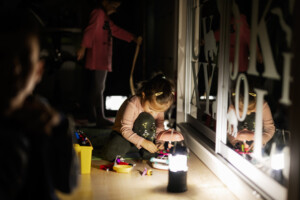
Blackouts can occur at any time, often because of storms, blizzards, or natural disasters, but occasionally due to an accident or mechanical failure. While disruptive and inconvenient, a power loss is no reason to panic. Waiting out the experience requires nothing more than simple planning and caution. Whether you live in the city or out in the country, this guide will walk you through what to do in a power outage in order to keep yourself safe and comfortable.
Remain Calm
Blackouts are temporary. Most are resolved within a few hours. Even the worst rarely last more than one or two days. Before breaking out your emergency supplies, check with your neighbors to determine whether the interruption is affecting your block or the entire city. If your house is the only one that’s dark, you’re probably dealing with a tripped circuit breaker. Check the electrical box in your home. Resetting the circuits may restore power. If it’s a regional issue, call your utility company to see whether they’re aware of the situation and can provide any updates.
Leave the Refrigerator Closed
As long as the seal isn’t broken, a fridge can remain cold for up to four hours after losing power. Freezers are even better insulated and can remain cold for up to 48 hours. But if the temperature in your fridge rises above 40°F for more than two hours, the meat, eggs, or dairy products inside will likely spoil and have to be thrown out after the power is restored.
However, if the blackout occurs during winter, it may be possible to preserve your food by moving it outside. The optimal temperature for storing food is 37°F. Because food spoils quickly, check to make sure the outdoors are sufficiently cold before storing food there. If there’s snow on the ground or wildlife in the area, it may be a good idea to store some items, like milk or meat, in coolers to keep them from freezing or being stolen.
Dress Warm and Light a Fire
Without central heating, most homes experience a noticeable temperature drop within half a day. Fireplaces are a great alternative heat source, since they don’t require power and their fuel is cheap and easy to procure. Many homeowners prefer to sleep in front of their fireplace during a power outage, but if that’s not practical, add extra blankets to your bed.
Wear extra layers during the day as well, to stay toasty, and leave your window shades open, to take advantage of natural sunlight. In some instances, homeowners with gas ovens have tried lighting them to heat their home. Utilities discourage this type of behavior, since it could lead to carbon monoxide leaks.
Stay Hydrated
In hot climates, blackouts increase your risk of heat exhaustion. Thanks to water towers and municipal pumping stations, most of which are equipped with backup generators, faucets, showers, and toilets normally continue working during a power outage. To prevent yourself from overheating, drink water regularly throughout the day, even if you’re not thirsty. It’s the best way to regulate your body temperature and ensure your systems function normally.
Minimize dehydration by staying indoors or in the shade as much as possible. Close the blinds on any window that receives direct sunlight, to prevent heat from entering your home. At night, open windows to take advantage of the cool air outside.
Use Flashlights, Not Candles
Open flames are an obvious fire hazard, which is why it’s best to use flashlights instead of candles during a power outage. You should have at least one flashlight for each person in your home, as well as an electric lantern to illuminate common areas. Keep spare batteries on hand as well, enough to power every portable light in your home, to ensure you can see clearly until the electricity has been restored.
Disconnect Appliances
Homes often experience a power surge after a blackout, which can damage sensitive electronics like computers, televisions, and smartphones. Surge protectors help safeguard against small power spikes which occur regularly over the course of a day, but the surge following a total outage can be much larger. Unplugging electronic devices prevents damage entirely, guaranteeing they’ll function normally once service resumes.
Activate Your Generator
Electric generators are extremely useful during a blackout, especially in rural areas where it may take longer to repair damaged power lines and equipment. However, because generators emit carbon monoxide, they should always be installed outdoors, at least twenty feet from your home, with exhaust ports pointed away from doors, windows, and even attached garages. For safety, install carbon monoxide detectors in every floor of your house as well, including the basement, to alert you in case generator exhaust accidentally drifts into your home.
Save Money on Electrical Repairs with Agway
Power outages are hard on your internal wiring. Overloading weakens its structural integrity, possibly leading to future breakdowns. Home insurance doesn’t cover this type of damage, but Agway does. Our EnergyGuard® repair program protects your heating, cooling, and electrical systems from issues caused by everyday wear and tear.
When the need for repair occurs, our customers don’t waste time searching for a qualified repairman. They call us instead. We maintain an extensive network of electricians and contractors. Once we receive your call, we send the first available technician straight to your door. There are no service fees or deductibles either. We pay for the visit and all covered parts. Don’t let an electrical problem upset your finances. Sign up and start enjoying the benefits of Agway EnergyGuard® today!